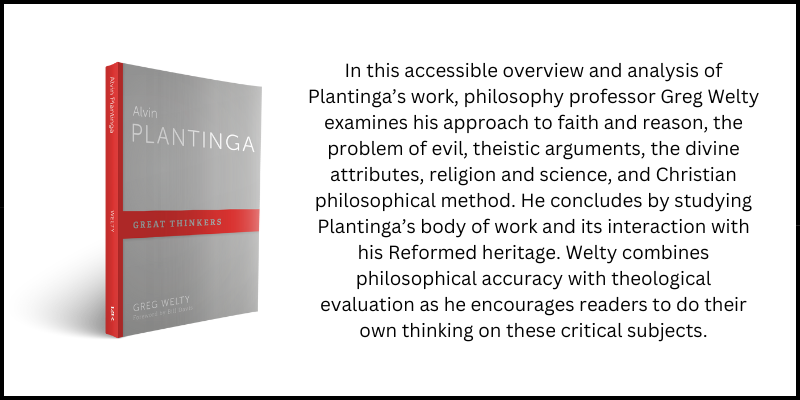The following is an interview with Greg Welty. He is the author of Alvin Plantinga, the most recent release in our Great Thinkers series.

1. What led you to write Alvin Plantinga? How did you become interested in exploring his teaching and critiquing it from a biblical perspective?
My good friend James Anderson at RTS-Charlotte seminary let me know that a volume on Alvin Plantinga was likely in P&R’s Great Thinkers series. (Anderson himself wrote the David Hume volume, which I really like.) So, I put together a proposal and things proceeded from there. In the Preface to the book I relate how hearing of Plantinga when I was an undergraduate philosophy student at UCLA in 1991 led me to initially examine his writings. Navigating the conflict I later discerned between Plantinga’s positions and those of my Oxford supervisor, Richard Swinburne, led me to become a philosopher: to become aware of multiple views held by equally capable individuals, and to consider deeply who had the better argument.
I think it’s not only important to identify the strengths and weaknesses of a thinker in light of a biblical perspective, but to rank the importance of these as well, and I try to do that in the book. Some of the ways that Plantinga’s work isn’t fully or clearly in line with the Reformed confessions are easily remediable; others not so much. But overall I find a lot of value in Plantinga’s body of work, and I’ve taught through it for twenty years or so.
2. What are the main things you learned from researching Alvin Plantinga; what do you consider his main contributions to Reformed epistemology to be?
I learned that Bill Davis at Covenant College was the perfect person to write the foreword to the book! As one of Plantinga’s students and teaching assistants, who observed him up close for years, Bill is happy to commend Plantinga as a deep, genuine, sincere believer in Jesus Christ. Bill also makes the highly relevant observation that some Christian philosophers are mainly called to speak to fellow Christians about the world of philosophy, while others are mainly called to speak to fellow philosophers about Christian beliefs, and Plantinga is in the latter, almost evangelistic, category.
I also learned that Plantinga’s model of faith and reason, and of how we come to know the Bible is the word of God, is remarkably like John Owen’s view, something that I didn’t realize until I read Owen’s The Reason of Faith (1677) after writing the Plantinga book. In The Reason of Faith (1677: 169-76), Owen makes a series of points that are virtually identical to points made by Plantinga in Warranted Christian Belief(2000: 256-66) and Where the Conflict Really Lies (2011: 178-83). These include the idea that reason is composed of multiple cognitive faculties (both noninferential and inferential), that faith is trust in divine testimony, full-stop (no further arguments needed), and that faith and reason are two ways of knowing. Faith is not an intellectually substandard source of belief. Rather, it’s just a different way to get knowledge.
I learned a few other things. Plantinga found it very difficult to figure out what it means to be a Christian philosopher. He devoted a lot of time at the University of Notre Dame to thinking about this issue. There’s a difference between being a Christian philosopher and being a philosopher who happens to be a Christian. Plantinga wrote a lot about this question—by my reckoning, he articulates five methodological principles and four distinct activities of the Christian philosopher. But he found it hard to practice the integration of Christianity and philosophy. With two notable exceptions (Warranted Christian Belief and “O felix culpa”), most of his philosophical work is about “mere theism,” not Christian distinctives. In the book I offer a reason why that is.
I also learned that, surprisingly, only two of Plantinga’s seven replies to the problem of evil depend on libertarian free will. I learned that Plantinga’s extended “Aquinas/Calvin model” of faith is compatible with determinism about saving faith. Finally, I learned that Plantinga’s rejection of various elements of classical theism doesn’t affect the cogency of his arguments all that much. (As far as I can tell, you can just add these elements to his views if you’d like.)
In my view, Plantinga’s “Reformed epistemology” is neither distinctively Reformed, nor an epistemology. It is, however, a clever reply to the insistence of unbelievers that our belief in God must be based on argument to be rational! His later and much more developed theory of ‘warranted Christian belief’ gives a central role to the testimony of Scripture and the work of the Holy Spirit in producing faith, and deploys this model to deflect some influential unbelieving criticisms of Christian faith.
3. What are some important truths that you would like readers to remember from reading Alvin Plantinga?
In the providence of God, Plantinga influenced a generation of Christian philosophers to be rigorous and bold in their defense of distinctive Christian claims. Like all other uninspired-but-very-useful thinkers, he finds his proper place not above us or below us, but at our side, helping us think through—as he would put it—the antitithesis between believing and unbelieving ways of thought.
ORDER Alvin Plantinga
- Amazon: $15.13
- Christianbook: $13.29
- P&R: $12.00
- Reformation Heritage Books: $12.00
- WTSBooks: $12.21


Comments